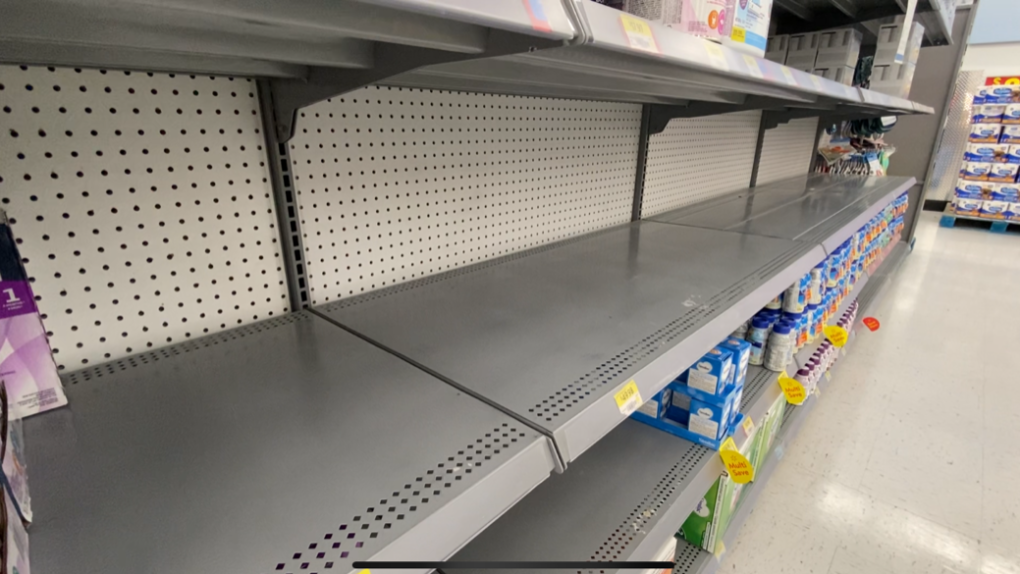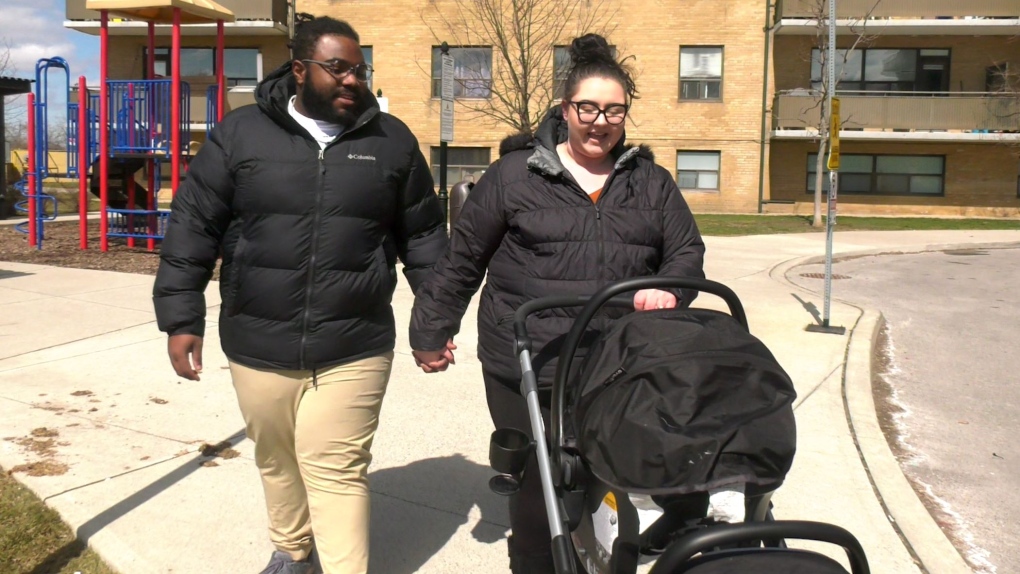Ontario parents drive over 5 hours to find baby formula for 8-month-old twins
An Ontario couple has had to drive more than five hours to find baby formula for their eight-month-old twins.
Mariah and Hakeem Walsh's twin boys arrived in July and since then the parents have been struggling to find formula.
"It's been a struggle," said Hakeem. "It's been a rollercoaster of emotions every time we got to get groceries. Either there's some or there's none and we got to call around."
At least once they've driven from Toronto to Sudbury, just to find food for their infants.
"Who do you call when you can't feed your babies?" asked Mariah. "I went to 10 grocery stores one day, no formula."
Many stores are limiting the amount parents can buy. CTV News Toronto went to a few stores and found signs on the shelves that read "please see customer service for assistance" and "currently out of stock." Another store had some of the formula on the shelf behind a glass door that was locked.
"(The) shortage is real for Canadians," said Sylvain Charlebois, the head of Dalhousie University’s Agrifood Lab.
 Baby formula shortage in U.S. leaves shelves bare at a Toronto store. (CTV News Toronto/ Sean Leathong)
Baby formula shortage in U.S. leaves shelves bare at a Toronto store. (CTV News Toronto/ Sean Leathong)
A baby formula shortage started a little more than a year ago when the largest U.S. formula maker plant shutdown after a recall was issued for several powdered Similac products that were thought to be linked to the death a few infants who developed a bacterial infection.
"The plant in Michigan is still not working at 100 per cent," said Charlebois. "They've been dealing with foods safety issues, but now there's a criminal investigation going on led by the Department of Justice since January."
There is a factory in Kingston called Canada Royal Milk (CRM) that according to its website was established by Feihe International Inc., which is "the largest producer of formula for infants and young children in the People's Republic of China." The website goes on to say that "most of our production will be for export, but we intend to develop nutritional products for the North American market as well."
Carey Bidtnes, Human Resources Manager for Canada Royal Milk, told CTV News Toronto the website is out of date and that "infant formula production has not started at all at the plant and no infant formula has been produced to be exported anywhere."
Bidtnes said CRM has completed formal submissions to Health Canada for the pre-market notification process to product infant formulas for domestic sale in August 2022. She said the submissions are under review and once approved, "CRM can begin production of infant formula for the domestic market immediately."
She also said, "Canada Royal Milk has not started production of infant formulations for any market. The reports that the company is exporting infant formula are not correct. The number one priority is completing the Health Canada review to produce for domestic sale."
Charlebois said both the province and federal governments subsidized that plant.
"Queens Park's portion was $24 million, but the Ottawa portion was never disclosed," he told CTV News Toronto. "Nobody really knows how much money Ottawa put in there. The City of Kingston gave 10 acres to that company from China."
CTV News Toronto asked Health Canada where the Canada Royal Milk application stood and was told they could not comment on “submissions under review.”
“We want to provide assurance that Health Canada works hard to ensure that any new infant formula submission is reviewed promptly,” officials said in a statement.
A spokesperson added the situation is not completely back to normal but the shortage of hypoallergenic infant formula "has largely subsided". The statement went on to say that "while the total national supply of regular infant formula remains sufficient at this time, we are aware of concerns about finding store-brand or lower-cost infant formulas."
The statement went on to say that in February, Health Canada approved "temporary importation" of a new powdered regular formula, Similac Advance.
"Additionally Health Canada has been reassured that there will be continued regular shipments of generic/ store brand formulas, including Kirkland and Parent's Choice with more coming to shelves over the coming weeks."
The Walshs say to feed their twin boys they spend about $200 each week on formula and have to visit multiple stores. The couple said they don't buy more than the store limits but what's frustrating is those limits don't take into account that they have twins.
"We have to spend $200 at a time because there's been too many close calls where we've only bought enough for eight days and then you go to the grocery store and you're all over Southwestern Ontario looking for a can of formula," said Mariah.
 Mariah and Hakeem Walsh are seen in this photograph. (Allison Hurst/CTV News Toronto)
Mariah and Hakeem Walsh are seen in this photograph. (Allison Hurst/CTV News Toronto)
On the Health Canada website, for information for parents on the how to manage the shortage, it encourages breastfeeding if possible and to maintain or increase breastmilk supply if parents are combining bottle-feeding and breastfeeding.
"I took medicine to breastfeed, I changed my diet, I took vitamins, everything my doctor told me to breastfeed," said Mariah. "I couldn't make enough milk for it to matter."
She said she's reached out to a number members of parliament at both the provincial and federal levels but has not heard back.
"No government official is taking the formula seriously," she told CTV News Toronto, "that's what really bothers me."
Charlebois said there's some potential progress to come from the federal budget released on Tuesday.
"There is a $333 million budget dedicated to dairy research to deal with surpluses and my guess over 10 years, my guess is there's probably going to be some financial capacity for the dairy industry to look into the baby formula situation. But it's over 10 years so there's no quick fix for what's going on right now."
CTVNews.ca Top Stories

W5 Investigates A 'ticking time bomb': Inside Syria's toughest prison holding accused high-ranking ISIS members
In the last of a three-part investigation, W5's Avery Haines was given rare access to a Syrian prison, where thousands of accused high-ranking ISIS members are being held.
'Mayday!': New details emerge after Boeing plane makes emergency landing at Mirabel airport
New details suggest that there were communication issues between the pilots of a charter flight and the control tower at Montreal's Mirabel airport when a Boeing 737 made an emergency landing on Wednesday.
Federal government posts $13B deficit in first half of the fiscal year
The Finance Department says the federal deficit was $13 billion between April and September.
Weather warnings for snow, wind issued in several parts of Canada
Winter is less than a month away, but parts of Canada are already projected to see winter-like weather.
Canadian news publishers suing ChatGPT developer OpenAI
A coalition of Canadian news publishers is suing OpenAI for using news content to train its ChatGPT generative artificial intelligence system.
Cucumbers sold in Ontario, other provinces recalled over possible salmonella contamination
A U.S. company is recalling cucumbers sold in Ontario and other Canadian provinces due to possible salmonella contamination.
Nick Cannon says he's seeking help for narcissistic personality disorder
Nick Cannon has spoken out about his recent diagnosis of narcissistic personality disorder, saying 'I need help.'
BREAKING Supreme Court affirms constitutionality of B.C. law on opioid health costs recovery
Canada's top court has affirmed the constitutionality of a law that would allow British Columbia to pursue a class-action lawsuit against opioid providers on behalf of other provinces, the territories and the federal government.
Real GDP per capita declines for 6th consecutive quarter, household savings rise
Statistics Canada says the economy grew at an annualized pace of one per cent during the third quarter, in line with economists' expectations.

































